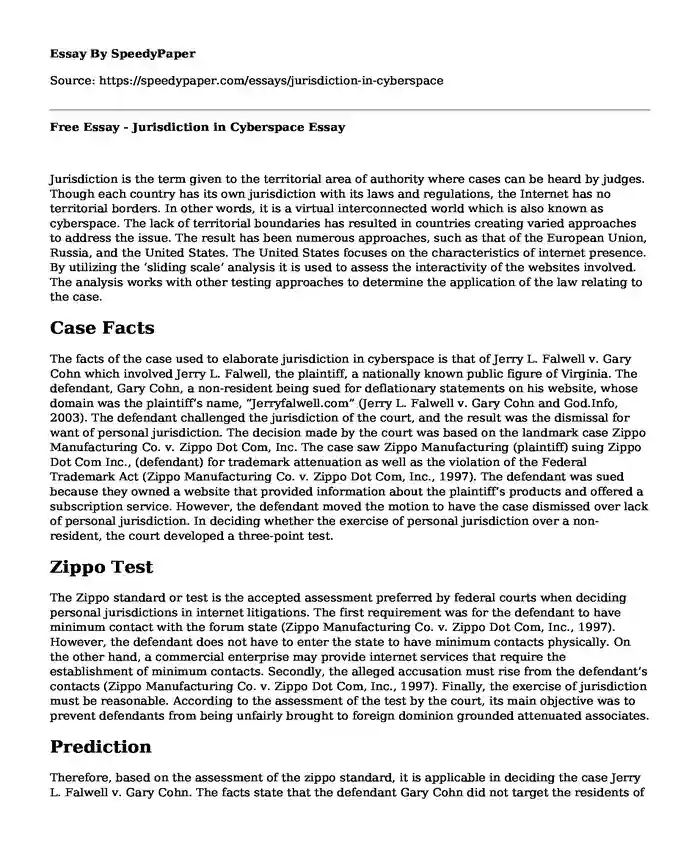
| Type of paper: | Essay |
| Categories: | Internet Judicial system Cyber security |
| Pages: | 3 |
| Wordcount: | 729 words |
Jurisdiction is the term given to the territorial area of authority where cases can be heard by judges. Though each country has its own jurisdiction with its laws and regulations, the Internet has no territorial borders. In other words, it is a virtual interconnected world which is also known as cyberspace. The lack of territorial boundaries has resulted in countries creating varied approaches to address the issue. The result has been numerous approaches, such as that of the European Union, Russia, and the United States. The United States focuses on the characteristics of internet presence. By utilizing the ‘sliding scale’ analysis it is used to assess the interactivity of the websites involved. The analysis works with other testing approaches to determine the application of the law relating to the case.
Case Facts
The facts of the case used to elaborate jurisdiction in cyberspace is that of Jerry L. Falwell v. Gary Cohn which involved Jerry L. Falwell, the plaintiff, a nationally known public figure of Virginia. The defendant, Gary Cohn, a non-resident being sued for deflationary statements on his website, whose domain was the plaintiff’s name, “Jerryfalwell.com” (Jerry L. Falwell v. Gary Cohn and God.Info, 2003). The defendant challenged the jurisdiction of the court, and the result was the dismissal for want of personal jurisdiction. The decision made by the court was based on the landmark case Zippo Manufacturing Co. v. Zippo Dot Com, Inc. The case saw Zippo Manufacturing (plaintiff) suing Zippo Dot Com Inc., (defendant) for trademark attenuation as well as the violation of the Federal Trademark Act (Zippo Manufacturing Co. v. Zippo Dot Com, Inc., 1997). The defendant was sued because they owned a website that provided information about the plaintiff’s products and offered a subscription service. However, the defendant moved the motion to have the case dismissed over lack of personal jurisdiction. In deciding whether the exercise of personal jurisdiction over a non-resident, the court developed a three-point test.
Zippo Test
The Zippo standard or test is the accepted assessment preferred by federal courts when deciding personal jurisdictions in internet litigations. The first requirement was for the defendant to have minimum contact with the forum state (Zippo Manufacturing Co. v. Zippo Dot Com, Inc., 1997). However, the defendant does not have to enter the state to have minimum contacts physically. On the other hand, a commercial enterprise may provide internet services that require the establishment of minimum contacts. Secondly, the alleged accusation must rise from the defendant’s contacts (Zippo Manufacturing Co. v. Zippo Dot Com, Inc., 1997). Finally, the exercise of jurisdiction must be reasonable. According to the assessment of the test by the court, its main objective was to prevent defendants from being unfairly brought to foreign dominion grounded attenuated associates.
Prediction
Therefore, based on the assessment of the zippo standard, it is applicable in deciding the case Jerry L. Falwell v. Gary Cohn. The facts state that the defendant Gary Cohn did not target the residents of Virginia; therefore, he failed to conform to the first test requirements. Secondly, the information on the website “Jerryfalwell.com” was for informational purposes. The defendant failed to conform to the second aspect of the test. Finally, the information was defamatory but did not take to meet the requirements of the third aspect of the test. Therefore, the case presented by the plaintiff Rev. Jerry Falwell against the defendant Gary Cohn and God. Info did not conform to the requirements set by the Zippo test.
Conclusion
The court decided that the website operated by Cohn was not aimed at the residents of Virginia rather, a national audience. Secondly, the information discussed was not specific to Virginia, but about former President Bush's Faith-Based Initiative and the plaintiff’s reaction (Jerry L. Falwell v. Gary Cohn, 2003). However, it was argued that the plaintiff’s congregation is based in Virginia, but it was countered that the plaintiff is a nationally known figure. Finally, the court concluded the assessment of the content by stating that the court cannot reasonably exercise jurisdiction over Cohn (Jerry L. Falwell v. Gary Cohn, 2003). The case failed to provide sufficient reasoning for the action, thereby dismissing the case.
References
Jerry L. Falwell v. Gary Cohn and God.Info, Civ. (2003). Act. No 6:02CV0040.
Zippo Manufacturing Co. v. Zippo Dot Com. Inc. (1997). 952 F.Supp. 1119.
Cite this page
Free Essay - Jurisdiction in Cyberspace. (2023, Sep 27). Retrieved from https://speedypaper.com/essays/jurisdiction-in-cyberspace
Request Removal
If you are the original author of this essay and no longer wish to have it published on the SpeedyPaper website, please click below to request its removal:
- Employment Laws Essay Sample
- Essay Example on TEC and ERP Systems
- Essay Sample on the Role of Information Systems in Banking
- Free Essay Sample. Bloody Sunday
- Essay Sample on Definition of Computer Crime and Cybercrime
- Free Essay Example on Ended Innocence
- Virtualization and the Cloud Computing World - Essay Sample
Popular categories




